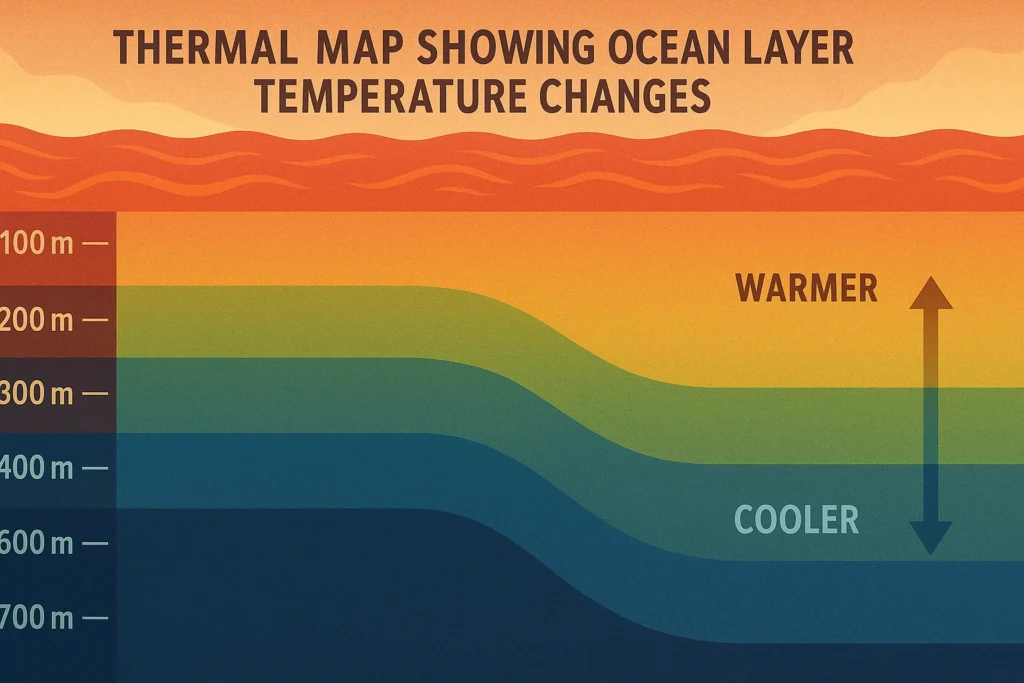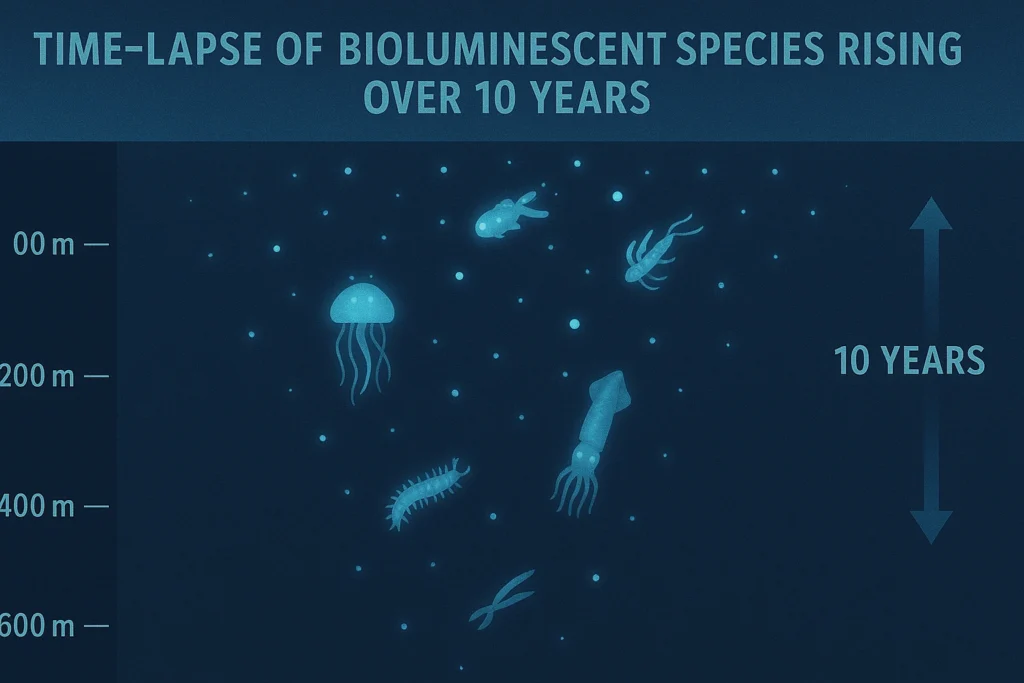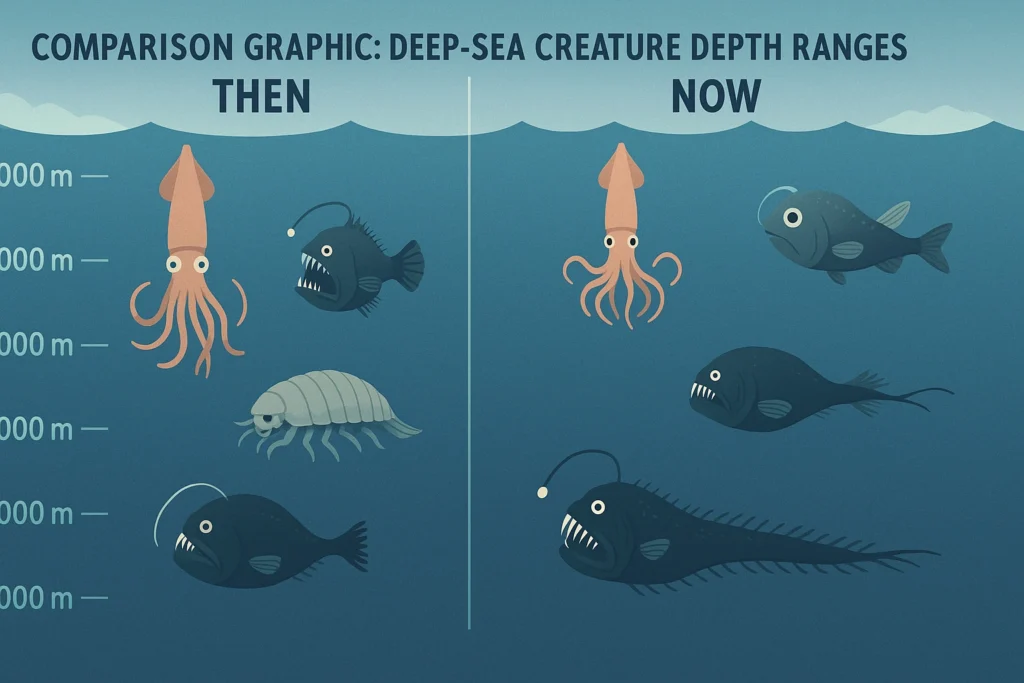A Chilling Phenomenon in Our Oceans
Fishermen off the Azores islands recently hauled up a nightmarish catch—a 5-meter-long giant squid, its tentacles still writhing with alien vitality. This wasn’t an isolated incident. Across the globe, from Japan to California, deep-sea creatures are appearing where they shouldn’t: anglerfish in shallow reefs, bioluminescent jellyfish in marinas, and the elusive oarfish—traditionally called “earthquake fish”—washing ashore in unprecedented numbers.
Breaking Down the Causes
1. The Ocean’s Fever: Rising Deep Sea Temperatures
- Data Point: The abyssal zone (3,000-6,000m deep) has warmed 0.5°C since 2010 (NOAA)
- Impact: Disrupts the cold-water barrier that traps deep species
- Case Study: Six-gill sharks now spotted at 200m vs. their usual 1,000m+ habitat

2. The Sound Invasion: Underwater Noise Pollution
| Source | Decibel Increase | Effect on Species |
|---|---|---|
| Shipping traffic | 32x louder since 1960 | Disorients whale navigation |
| Deep-sea mining | 140dB pulse waves | Forces vertical migration |
| Military sonar | Instantaneous 200dB+ | Causes “gas bubble trauma” |
“These animals are essentially fleeing a sonic warzone.” — Dr. Sylvia Earle, Oceanographer
3. The Methane Connection
- Subsea permafrost melt releases methane plumes
- Creates “dead zones” with low oxygen/high acidity
- Forces chemosynthetic life (tube worms, etc.) upward
Bizarre Biological Consequences
Creatures We’re Seeing More Often
- Vampire Squid: Now appearing at 300m (normally 900-3,000m)
- Dumbo Octopus: Spotted near oil rig cameras at 150m depth
- Black Dragonfish: Caught in shallow trawl nets off Chile
Physiological Dangers
- Barotrauma: Exploding swim bladders
- Sunlight Damage: Bleached bioluminescent organs
- Predator Exposure: Slow-moving abyssal species eaten by sharks

Scientific Warnings & Ecological Impacts
The Domino Effect
- Deep-sea nutrient cycles disrupted
- Shallow-water species outcompeted
- Unknown pathogens potentially surfacing
Most Concerning Finding: DNA analysis shows 40% of risen species carry previously unknown microbes in their microbiomes
Human Connections & Risks
Fisheries Impact
- Portugal: Deep-sea crabs ruining shallow-water catches
- Japan: “Blobfish” contamination in sushi supply chains
The Leviathan Mystery
- Sonar detects 12m+ unidentified shapes following thermal vents upward
- Could explain recent “sea serpent” sightings near Indonesia
What Can Be Done?
Immediate Solutions
- Quieter ship propellers (being tested by Maersk)
- Deep-sea sanctuaries (UN proposing 5 new protected zones)
- Methane capture projects in Arctic waters
Citizen Science Opportunities
- Report unusual catches to iNaturalist’s Deep Sea Watch
- Join NOAA’s Hydrophone Network to monitor sound pollution
Key Takeaways
🌡️ Deep ocean warming 3x faster than predicted
🎧 Noise pollution creating “underwater deserts”
🦑 Abyssal species appearing at record shallow depths
⚠️ Ecological chain reaction with unknown consequences
🔍 New discoveries happening monthly as situation evolves
FAQ
Q: Are these deep-sea creatures dangerous to humans?
A: Most can’t survive long at surface pressures. However, some like the fangtooth fish have extremely sharp teeth.
Q: Could this be related to climate change?
A: Indirectly—warming enables noise/sound to penetrate deeper, creating compound effects.
Q: Have any species gone extinct due to this shift?
A: Yes—the abyssal sea cucumber hasn’t been seen since 2023.
Q: How can I see these creatures responsibly?
A: Monterey Bay Aquarium’s new “Deep Sea Refugees” exhibit showcases rescued specimens.
External Links for Further Reading
“Warping Sound in the Ocean”
This disturbing oceanic exodus represents one of climate change’s least visible but most profound impacts—a watery warning we can’t afford to ignore. As the deep gives up its ghosts, humanity faces urgent questions about our stewardship of Earth’s final frontier.




s9vn3p